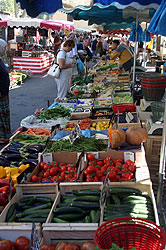
I couldn’t let this discovery go by without recording it. So here’s a way to fold a shirt in 3 seconds flat: Japanese way of folding T-shirts!.

I couldn’t let this discovery go by without recording it. So here’s a way to fold a shirt in 3 seconds flat: Japanese way of folding T-shirts!.

Just found this article from the May edition of the Observer Food Monthly, but better late than never right?
Top 50 Things a Real Foodie Should Do
To celebrate Observer Food Monthly’s fiftieth edition, we asked some of our favourite bon viveurs what they considered most essential to do before they died. …
31) Get up early and go to market
Preferably in Provence. The smell is a mix of pine and cigarette smoke with the occasional strong hit of goat cheese. Cogniscenti head for the Var area, particularly the markets of Cotignac (summer only), the bustling town of Salernes (Wednesday and Saturdays) and Aups (famous for truffles).
Malcolm Gladwell has written an interesting article in the New Yorker about the Bush Administration’s innovation to improve health care in America, known as Health Savings Accounts.
Here’s a brief excerpt:
A country that displays an almost ruthless commitment to efficiency and performance in every aspect of its economy — a country that switched to Japanese cars the moment they were more reliable, and to Chinese T-shirts the moment they were five cents cheaper — has loyally stuck with a health-care system that leaves its citizenry pulling out their teeth with pliers.
You can read the rest at The Moral-Hazard Myth.
In recent weeks I’ve been captivated by Google Earth.
If you don’t know it, the BBC television programme Click Online has a good description of this spectacular mapping software at Portal race goes local and global.

The BBC has started to provide MP3 recordings of some of its radio programmes. In cyberspace this phenomenon is called “podcasting” (after the ubiquitous Apple iPod which can be used to play these files) and it’s all the rage.
I’m a cynic when it comes to the hype surrounding podcasting. It’s been simple to record radio programmes on tape for most of my life, and it’s been possible to make your own MP3 recordings automatically, using software such as Total Recorder, for several years already. So I find it difficult to get excited about recording them digitally now.
Nevertheless, I welcome the BBC’s initiative, if only because one of my favourite Radio 4 programmes is included in the trial — In Business. See the BBC’s Download and Podcast Trial for more information.
A sign of significant progress in North American culture …
CHICAGO — It is a source of frustration at cookouts everywhere: There are never enough hot dogs, and there always seem to be way too many buns.
Hot dogs and hot-dog buns are sold in different quantities, but that is going to change beginning today.
Vienna Beef and Alpha Baking Co., which manufactures S. Rosen’s buns, promise to sell the buns and hot dogs in the same numbers.

The Baby Name Wizard’s
NameVoyager is interesting. It displays a dynamic frequency distribution for the most popular (top 1,000) first names for American children born since 1880.
Having run some of my relatives’ names through it I can see that my extended family has been pretty conventional in its choice of names over the years, despite not residing in the US.
Excerpts from Stet by Diana Athill, who was apparently considered the best editor in London during the second half of the twentieth century.
Writing about the first book she was responsible for publishing at André Deutshe:
I would soon begin to find such fantasies a waste of time — of my time, anyway — but then, in addition to liking the sobriety and precision of the style, I felt the pull of mystification: ‘I can’t understand this — probably, being beyond me, it is very special.’ This common response to not seeing the point of something has a rather touching humility, but that doesn’t save it — or so I now believe — from being a betrayal of intelligence which has allowed a good deal of junk to masquerade as art. Whether that matters much is another question: throughout my publishing life I thought it did, so I am glad to say that the publication of The Tailor’s Cake in 1946, beautifully translated by Betty Askwith, was the only occasion on which I succumbed to the charm of mystification.
On her love of books:
I loved that book [The Toe-Rags by Daphne Anderson] even more than I loved Morris Stock’s [Parents Unknown: A Ukrainian Childhood]; and both of them I loved not for being well-written (though both were written well enough for their purposes), but because of what those two people were like. They brought home to me the central reason why books have meant so much to me. It is not because of my pleasure in the art of writing, though that has been very great. It is because they have taken me so far beyond the narrow limits of my own experience and have so greatly enlarged my sense of the complexity of life: of its consuming darkness, and also — thank God — of the light which continues to struggle through.
Much to my surprise Diana Athill writes a lot about Caribbean literature in Stet. Not only are there long chapters on Jean Rhys and V. S. Naipaul, but Athill was also Eric Williams’ editor and travelled to both Dominica and Trinidad & Tobago in the course of her career. In addition, she had an affair with Hakim Jamal, an American disciple of Malcolm X, who was involved in the murders in 1972 that formed the subject of Naipaul’s story The Killings in Trinidad. I found it all quite unexpectedly fascinating and would recommend it, not least because it’s exceptionally well-written.
Here’s 1 minute and 47 seconds of poetry from NPR that’s sure to put a smile on your face as this week comes to an end: Reduplicatives.
Never let it be said that the web isn’t practical. Here’s a link to an essential site illustrating 15 different ways to tie your shoes: Ian's Shoelace Site
By continuing to use the site, you agree to the use of cookies. more information
The cookie settings on this website are set to "allow cookies" to give you the best browsing experience possible. If you continue to use this website without changing your cookie settings or you click "Accept" below then you are consenting to this.